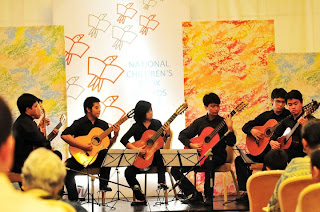The University of the Philippines College of Music Department of Musicology presents A Concert on West African Music and Dance by the UP Kekeli Ensemble led by percussionist and Professor Dr. royal hartigan. The concert will be held at the UP College of Music Abelardo Hall Auditorium this August 20, 2010 Friday at 7:00PM. Members of the UP Kekeli African Drumming and Dancing Ensemble are Tusa Montes, Jenny de Vera, Toni Bernardo, Jinggoy Balane, Rodel Celestial, Patricia Rodriguez, Catherine Cheng, Catherine Grace de Leon, Frederick Ruiz, Gideon Amaca, Roan Opiso, Isobelle Primero, Valerie Vibar and Thristan Mendoza.
The UP Kekeli African Drum and Dance ensemble performs the traditional music, dance and songs of West Africa, including the traditions of the Asante, Ewe, Dagbamba, Dagara and Ga peoples. Members of our group visited Ghana to study and perform Asante Kete and were invited to perform to the Asantehene's (paramount chief of the Asante people) palace near Kumasi last June 2010. The group usually only performs when led by a master drummer from the culture, but have been given permission to share this great tradition in their performance this August 20. The group is also believed to be the first ensemble of its kind in Asia.
Anyone interested in additional information about this FREE special concert event can contact Miss Patricia Rodriguez at 09157675355 and Miss Jenny de Vera at 09159213440.
About the Dr. Royal Hartigan
Royal Hartigan was awarded an A.B. in Philosophy from St. Michael's College in 1968, specializing in medieval metaphysics and the existentialism of Albert Camus and Jean-Paul Sartre. He received a B.A. in African American music at the University of Massachusetts, Amherst, in 1981, studying with Roland Wiggins, Frederick Tillis, Reggie Workman, Archie Shepp, Max Roach, and Clifford Jarvis. royal earned his M.A. and Ph.D. degrees in world music at Wesleyan University in 1983 and 1986, studying intensively with Edward Blackwell, Freeman Donkor, Abraham Adzenyah, and other master artists from Java, India, China, and West Africa.
He has taught ethnomusicology, African drumming, and world music ensemble at The New School for Social Research in New York and the Graduate Liberal Studies program at Wesleyan University. royal helped develop and taught graduate and undergraduate courses in world music, large and small jazz ensembles, African American music history, and West African drumming and dance at San Jose State University before assuming his current position in world music at the University of Massachusetts Dartmouth.
His publications include Cross Cultural Performance and Analysis of West African, African American, Native American, Central Javanese, and South Indian Drumming, a 1700-page analysis of world drumming traditions (Proquest Press); articles in Percussive Notes, World of Music, Annual Review of Jazz Studies, and The African American Review; and three books with CD and DVD, West African Rhythms for Drumset (Manhattan Music/Warner Brothers), Dancin' On the Time (Tapspace), and WEst African Ewe Rhy.
He has given lectures and clinics on world music and jazz in Africa, China, Europe, and North America. He travels to West Africa each summer to teach, perform, and do research, collaborating with J.H. Nketia at the Institute for African Studies, University of Ghana, and the musicians at the Dagbe Cultural Center, Kopeyia village, Volta Region, Ghana.
About African music
The UP Kekeli Ensemble will be performing the traditional instrumental music, dance, and song of the coastal rainforest cultures of West Africa, including peoples from the present day countries of Cote D'Ivoire, Ghana, Togo, Benin, and Nigeria. The dance drama, which includes the three dimensions of instrumental music, dance, and song, is an expression of events in the life-, agricultural-, and seasonal cycles. It connects people as members of a community and strategizes for success in the individual and collective struggle for survival - the transcendence of physical, economic, and political limitations. Drumming, dance, and song are highly sophisticated, complex, and powerful means in oral tradition by which people remember genealogies, recall group history, and maintain personal connections with each other, ancestors, a spiritual realm, and the creator.
The historic global movement of African peoples since the 1500s has brought this African sense of community, transcendence, and spirit to many parts of the globe, resulting in new forms of expression shared by people of all cultural backgrounds. These include Blues, Shouts, Clapping Plays such as Pattin' Juba, Gospel, Rhythm and Blues, Jazz, Reggae, Rumba, Samba, Candomble, Lucumi, Vodun, and numerous other styles, including much of the world's popular music since the dawn of the 20th century. The music and dance of Africa is an ancient and contemporary expression that is a humanizing force in our paths through life.
PROGRAM
Asaadua - a processional music of the Asante people of Ghana, referring to the many diverse branches of the human tree.
Gahu - a recreational dance drumming of the Ewe people of Ghana. lead drum rhythms call dance movements.
Anlo Kete - a social music of the Ewe people.
Bawa - a harvest dance drumming of the Dagara people of northern Ghana. drum rhythms reflect the dance.
intermission
Misagodzi - Sovu - Adavu - these pieces commemorate the Ewe escape from Notsie in present-day Togo.
Sikyi - a social music of the Asante focusing on courtship.
Agbeko - a warrior dance drumming of the Ewe people. dance movements depict ancient strategies, heroism and codes of honor.
Kpanlogo - a recreational music of the Ga people of Ghana.

















